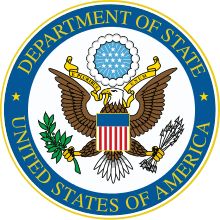United States Ambassador to Texas
| Charges d'Affairs of the United States to Texas | |
|---|---|
|
Seal of the United States Department of State | |
|
Incumbent None | |
| Inaugural holder |
Alcée Louis la Branche as Chargé d'Affaires |
| Formation | March 7, 1837 |
| Abolished | August 9, 1845 (Annexation of Texas) |

The United States recognized the Republic of Texas, created by a new constitution on March 2, 1836, as a new independent nation and commissioned its first representative, Alcee La Branche as the chargé d'affaires in 1837. The U.S. never sent a full minister (the term "ambassador" was not in use) to Texas, but a series of chargés represented the government in Austin until Texas joined the Union.
In 1845 Texas joined the United States as a state.
Chargés d’Affaires
U.S. diplomatic terms
Career FSO
After 1915, The United States Department of State began classifying ambassadors as career Foreign Service Officers (FSOs) for those who have served in the Foreign Service for a specified amount of time.
Political appointee
A person who is not a career foreign service officer, but is appointed by the president (often as a reward to political friends).
Appointed
The date that the ambassador took the oath of office; also known as “commissioning”. It follows confirmation of a presidential appointment by the Senate, or a Congressional-recess appointment by the president. In the case of a recess appointment, the ambassador requires subsequent confirmation by the Senate.
Presented credentials
The date that the ambassador presented his letter of credence to the head of state or appropriate authority of the receiving nation. At this time the ambassador officially becomes the representative of his country. This would normally occur a short time after the ambassador’s arrival on station. The host nation may reject the ambassador by not receiving the ambassador’s letter, but this occurs only rarely.
Terminated mission
Usually the date that the ambassador left the country. In some cases a letter of recall is presented, ending the ambassador’s commission, either as a means of diplomatic protest or because the diplomat is being reassigned elsewhere and replaced by another envoy.
Chargé d'affaires
The person in charge of the business of the embassy when there is no ambassador commissioned to the host country. See chargé d'affaires.
Ad interim
Latin phrase meaning "for the time being", "in the meantime". See ad interim.
After 1915, The United States Department of State began classifying ambassadors as career Foreign Service Officers (FSOs) for those who have served in the Foreign Service for a specified amount of time.
Political appointee
A person who is not a career foreign service officer, but is appointed by the president (often as a reward to political friends).
Appointed
The date that the ambassador took the oath of office; also known as “commissioning”. It follows confirmation of a presidential appointment by the Senate, or a Congressional-recess appointment by the president. In the case of a recess appointment, the ambassador requires subsequent confirmation by the Senate.
Presented credentials
The date that the ambassador presented his letter of credence to the head of state or appropriate authority of the receiving nation. At this time the ambassador officially becomes the representative of his country. This would normally occur a short time after the ambassador’s arrival on station. The host nation may reject the ambassador by not receiving the ambassador’s letter, but this occurs only rarely.
Terminated mission
Usually the date that the ambassador left the country. In some cases a letter of recall is presented, ending the ambassador’s commission, either as a means of diplomatic protest or because the diplomat is being reassigned elsewhere and replaced by another envoy.
Chargé d'affaires
The person in charge of the business of the embassy when there is no ambassador commissioned to the host country. See chargé d'affaires.
Ad interim
Latin phrase meaning "for the time being", "in the meantime". See ad interim.
- Alcée Louis la Branche
- Title: Chargé d'Affaires
- Appointed: March 7, 1837
- Presented credentials: October 23–27, 1837
- Terminated mission: Left Texas soon after June 5, 1840
- George H. Flood
- Title: Chargé d'Affaires
- Appointed: March 16, 1840
- Presented credentials: June 21–22, 1840
- Terminated mission: Presented recall July 21, 1841
- Joseph Eve[1]
- Title: Chargé d'Affaires
- Appointed: April 15, 1841
- Presented credentials: July 21, 1841
- Terminated mission: Relinquished charge June 3, 1843
- William Sumter Murphy[2]
- Title: Chargé d'Affaires
- Appointed: April 10, 1843
- Presented credentials: June 16, 1843
- Terminated mission: Died at Galveston, Texas, July 13, 1844
- Tilghman A. Howard
- Title: Chargé d'Affaires
- Appointed: June 11, 1844
- Presented credentials: August 2, 1844
- Terminated mission: Died at Washington, Texas, August 16, 1844
- Andrew J. Donelson[3]
- Title: Chargé d'Affaires
- Appointed: September 16, 1844
- Presented credentials: November 29, 1844
- Terminated mission: Left Texas on or soon after August 9, 1845
- Note: Texas was annexed to the United States effective December 29, 1845.
Notes
- ↑ Eve was commissioned during a recess of the Senate and recommissioned after confirmation on June 29, 1841.
- ↑ Murphy was commissioned during a recess of the Senate. His nomination of December 16, 1843, was rejected by the Senate.
- ↑ Donelson was commissioned during a recess of the Senate and recommissioned after confirmation on January 13, 1845.
Sources
See also
This article is issued from Wikipedia - version of the 7/30/2016. The text is available under the Creative Commons Attribution/Share Alike but additional terms may apply for the media files.
